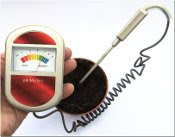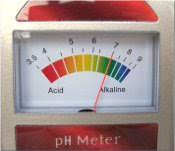 Before applying the top-dressing, I added some limestone to remove the soil acidity after testing the pH (acidity level) with an electronic meter. This is not an exact science. But it does give some indication, especially when the average of a few samples is used.
Before applying the top-dressing, I added some limestone to remove the soil acidity after testing the pH (acidity level) with an electronic meter. This is not an exact science. But it does give some indication, especially when the average of a few samples is used. A ph of 7 indicates neutral. As the pH goes lower, soil becomes more acid; and vice versa.
A ph of 7 indicates neutral. As the pH goes lower, soil becomes more acid; and vice versa.About pH 6.5 suits most (but not all) plants. Calcifuges (lime-hating) plants, such as rhododendrons, azaleas, etc. grow best at pH levels below 5.5 (because the pH scale is logarithmic, a one unit drop represents a tenfold decrease, so pH 6 is ten times more acid than pH7; but pH 5 is 100 times more acid). Calcicoles (lime-loving) are generally found on limestone soils, where the pH is above 7.0.
Lawns are slightly complicated. Normal utility lawns (which are often comprised of only perennial ryegrass) like a neutral to slightly alkaline soil (pH6.5 to 7.5). However, if the turf contains luxury grasses (as most do), these prefer a lower pH of about 6.5.
Persistent moss is often an indication of a too acid soil.
1 comment:
Can u please tell me that how can we treat this disease.....
Post a Comment